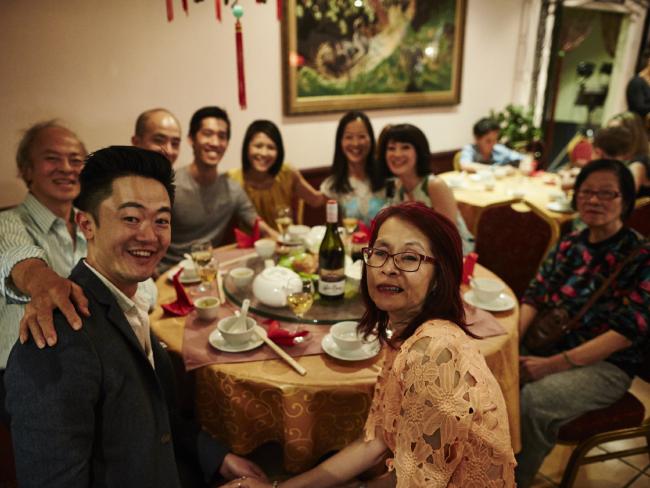
I have to admit, I’m late to the party: I just watched the first episode of SBS’ new dramedy, The Family Law. Thanks #ourtaxpayerdollars for SBS on demand.
And I am not kidding you, I actually cried for the first five minutes. There’s nothing sad happening in the show, quite the opposite, but there was something akin to a post-orgasmic relief that resulted in some incredibly weird choked-up feeling: a blending of happiness, relief, recognition, connection, self-affirmation, air-fist-pumping and joy.
I’ve plenty of good excuses for not having watched the show until now: work, life, work, life, Peril, life, work, work, tired, RSI, tired, sleep. Life.
As is so often the case, with my Peril hat on, I was occupied finding someone like Joon-Yee Kwok to provide a sensitive and personal “me-view” of the show. You see, we’re delighted to see mainstream publications giving long lead coverage to the show, considering perspectives of race and representation on television, and generally enjoying a new offering that is, at its core, funny, self-deprecating and wry, placing Australian dagginess at the fore. We’re happy that media channels like Broadsheet can recognise:
With an almost all-Asian-Australian cast, The Family Law is radical in its normalcy.
So we wanted to provide you with a different insight, not into the meta-product-industry-critical-wah-wah that comes from producing a television show that features someone we might recognise as representative of “Australians”, but from the personal perspective of what that experience feels like to an individual audience member with literal and metaphorical “skin in the game”. As Editor, however, I hadn’t had a chance to watch the show, because sometimes there’s so much energy devoted to talking about the art/the writing/the show/the funding/the industry, you don’t get to enjoy any god-damn art.
I know now why Joon-Yee was skipping family dinner to join the Laws (in cameo and in character!) to play spot the place, spot the face, and spot the difference between her family and their television proxies.
Still, I couldn’t turn my “meta-head” off. Watching Ben’s talent show meltdown, I’m weirdly reminded of Shinen Wong, writing for our Peril/Writers Victoria collaboration – questioning, shaking and wrestling with this feeling of “acceptability” against cultural whiteness and normativity; challenging the push for “diversity”; querying just who needs #diversebooks, because:
People from culturally and linguistically diverse backgrounds, for example, have been writing, publishing, sharing oral histories, practising our spiritualities and so on, for eons without these works becoming necessarily or primarily representative of fulfilling a country’s or an industry’s needs for aesthetic or economic diversity and inclusion, or as demonstration of enlightened tolerance and self-reflexivity of the ‘we’ who otherwise continue to ignore us.
Am I crying because I see myself? Or because someone else might see me? I am delighted or angry? Or both?
It’s reductive to assume these disparate cultural “artefacts”, are a part of the same conversation, but I love seeing the way that commentary like Shinen’s and shows like The Family Law bring together high-theory, low-art, low-theory, high-art intersections in my head. I get a buzz when prominent television/film stars spark public conversations through seemingly throw away comments like:
Thank you to all the straight white guys who dominated movies and TV so hard, and for so long, that stories about anyone else seem kind of fresh and original
- Alan Yang, Critic’s Choice Awards
Part of that buzz makes me wonder just what the upcoming Stella Diversity Count for literature could and should achieve. Angela Serrano’s words, also writing for our Writers Victoria collaboration, asking publishers, readers, buyers, librarians, educators and the community at large to consider “our collective Australian culture”, Angela is talking about an inclusive “we” and highlighting the imperfection of statistics, comparisons and a mere “numbers game” approach to diversity. Sometimes the numbers matter, sometimes the numbers don’t matter, and the sometimes they matter all over again.
If you haven’t read Benjamin’s thoughtful reflection on the white-blindness of Australian television yet, do check it out – while he is talking specifically about television, many of his thoughts are transferable to other areas of Australian arts and culture, including writing.
Skip forward a couple of decades and it’s still relatively rare to see Asian faces – or any non-white faces – on Australian TV, bar competitive reality shows like Masterchef, Australian Idol and X-Factor. (Turns out, singing and cooking are pretty democratic skills! Who knew?) In other multicultural countries like the US, Canada and UK, all-white TV shows would be rightly called out and pilloried, mainly because: one, citizens care about reflecting diversity on screen; and two, their industries use mechanisms, like quotas and diversity officers – to ensure that diversity.
Meanwhile, when another Australian comedy or drama launches with a predominantly or all-white cast, few people seem to notice. Local TV makers often argue their casting practices are colour-blind – that the people cast in the show are there because of merit. But Australian TV’s problem isn’t colour-blindness; it’s white-blindness, a condition where people don’t even register their TV show is more retina-searingly white than a Klan Rally at a yacht club.
- Benjamin Law, Asian Faces Swamping the Screen
Five years ago, I decided that because of work, life, work, life, Peril, life, work, work, tired, RSI, tired, and sleep, I would have to turn the television off. I simply no longer had time to include watching television in my life and the quality of free to air television was making me depressed about the world and sucking precious hours from my day.
Yesterday, I took my television out of storage and plugged it back into the wall. You can blame the Laws.
The Family Law screens on SBS on Thursdays at 8.30pm.
